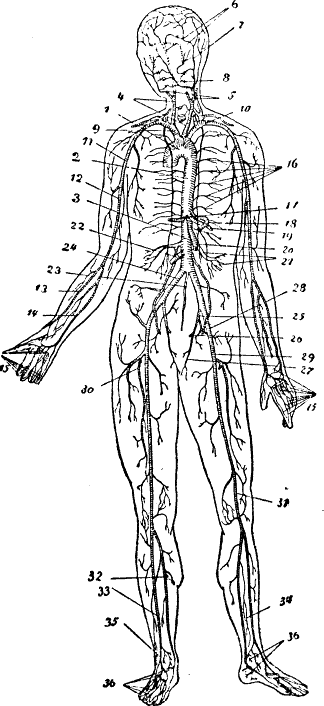The DNA Network |
| How much computer space is needed to store your full genome? [Yann Klimentidis' Weblog] Posted: 30 Jun 2008 06:43 PM CDT  This is an interesting question and one that Dan at Genetic Future explores at length. This is an interesting question and one that Dan at Genetic Future explores at length.First, there still seems to be many limitations to the process of sequencing, so for every base and for each chunk that gets sequenced and lined up with the rest, there is a fair degree of uncertainty. According to Dan and his various calculations, this can result in a sequence taking up to several terabytes. In the future, if all you want is your sequence and no other information it would take: 2 bits per base * 6 billion bases * 1 byte per 8 bits = 1.5 billion bytes = 1.5 Gb According to Wikipedia that's the equivalent of about 1500 novels or 26 hours of MP3 music. Since most of our genome is the same across all individuals, you might just want information about the sites or regions that are known to vary. This would result in even smaller file sizes. |
| Looming news [The Tree of Life] Posted: 30 Jun 2008 06:27 PM CDT Just having some fun with/at Carl Zimmer who claims he has some news to post very soon. See |
| The Best Predictive Health Ethics Blogs - June 2008 [PredictER Blog] Posted: 30 Jun 2008 03:15 PM CDT California and Direct-to-Consumer Genetic Testing: California's decision to send cease-and-desist letters to thirteen direct-to-consumer genetic testing companies (including 23andME, deCODEme, Knome, and Navigenics) ignited a blogging wild-fire of mostly outraged responses. Some of the more widely read expressions of protest were blogged at Wired Science and include Thomas Goetz's much-echoed Attention, California Health Dept.: My DNA Is My Data (17 June 2008). For an alternative reaction see Steve Murphy's posts on the topic at Gene Sherpa, which include: Do you hear that sound Mr Anderson? (15 June 2008), A$$ Kicking (17 June 2008), and R'Uh-R'Oh Shaggy!!! (17 June 2008). Although many of the replies to Murphy's posts offer only more expressions of outrage, Daniel MacArthur at Genetic Future engages Murphy in a thoughtful exchange beginning with California cracks down on genetic testing companies (15 June 2008) and Cat-fight over California (18 June 2008). Finally, for a good overview of the news and blogging on the subject, see Blaine Bettinger's recent post The Genetic Mess in California - A Round-Up, and My Thoughts (30 June 2008) at The Genetic Genealogist. Employee Wellness Matt Mealiffe of DNA and You writes in response to the news that Japan will require companies and local governments to "measure the waistlines of Japanese people between the ages of 40 and 74 as part of their annual checkups" with the standard of "33.5 inches for men and 35.4 inches for women" (see Norimitsu Onishi, Japan, Seeking Trim Waists, Measures Millions. The New York Times. 13 June 2008). In Mealiffe's assessment (14 June 2008), mandatory waistline measurement is "bold social policy" which may be, however, genetic discrimination. In an unrelated post on a similar topic, Jane Sarasohn-Kahn of Health Populi reports employee attitudes regarding the privacy risks of employers' wellness programs. Writing in Is worker wellness a privacy issue? (5 June 2008), Sarasohn-Kahn summarizes the findings of a recent report: "Employees are concerned that this information could be used to reduce benefits or for even more egregious purposes". An overview of the findings, "Health and Wellness: the shift from managing illness to promoting health" is available from the Center for Studying Health System Change [PDF]. Law & Policy Andrew W. Torrance of BioLaw: Law and the Life Sciences reflects on the sometimes presumed amoral status of patent law in U.S. – a status that is not presumed in Europe. In Patently Immoral Genes (2 June 2008), Torrance shares the recent, related work of the European Society of Human Genetics ("ESHG") which "has issued recommendations that would severely limit patents on genes in the European Patent Office (EPO) and member states of the EPC." According to Torrance, "the ESHG recommends that the EPO establish an 'ethics committee' to police the patentability of controversial technological innovations". He believes that this news may be of interest to policy makers in the States, including: California Democrat, Xavier Becerra, a sponsor of the "Genomic Research and Accessibility Act" (H.R.-977 – Thomas | GovTrack.us). Nick Agar writes at What Sorts of People on a report by The Bioethics Council of New Zealand on the completion of its program Who gets born? Pre-birth testing. The report responds to the New Zealand government's decision to fund pre-implantation genetic diagnosis for couples with a high risk of conceiving a child with a genetic disorder. In NZ bioethics council (27 June 2008), Agar notes that "the emphasis is very much on facilitating parental choice, with health professionals given the role of supplying parents with the information they need to make choices consistent with their values". He observes that the Council made a deliberate effort to solicit participation from a wide range of "interested parties", but cautions that there may be "a bit of fallacy of bureaucratic representativeness here – if a committee's composition approximately matches the representation of various communities in the general population then its pronouncements must be representative of the viewpoints of those different communities". Personalized Medicine Reflecting, in part, on the prevalence of "Personalize Medicine" in the recent 2008 BIO Convention, Jennifer Miller at Bioethics International defines the topic and introduces some of the ethical and legal issues. She identifies six ethical issues in Personalized medicine: an introduction, its promises and the ethics (26 June 2008): (1) just access to, allocation and application of the new technologies, (2) privacy concerns, (3) respecting parties' autonomy, (4) obtaining quality informed consents, (5) intellectual property rights, particularly in connection with bio-banking, (6) overall resource allocation and prioritization questions …. Reviews Bonnie Green, writing for BioethicsBytes (17 June 2008), reviews "An Adventure into Ourselves", the third episode of a four-part television series entitled DNA: The Human Race (Channel 4, 2003). [BioethicsBytes hosts and reviews resources for ethics education. The project aims "to assist in the teaching of bioethics, with particular emphasis on multimedia materials (film, TV, streamed media) as case studies".] Green's thorough review of "An Adventure into Ourselves" marks interesting quotations and highlights the social and political context of the Human Genome Project (HGP). She observes that the series and the episode form "an excellent basis for teaching both the science and bioethics of the HGP and large scale sociotechnical projects". The post also includes YouTube footage from related programming about the X-Prize. Writing for Gene Expression, "Herrick" reviews Heredity and Hope: The Case for Genetic Screening, by Ruth Schwartz Cowan (Harvard University Press: 2008. 270 pp. $27.95, £18.95). This blogger points to three aspects of Cowan's book on genetic screening. In Heredity and Hope by Ruth Schwartz Cowan (11 June 2008), "Herrick" observes that Cowan distinguishes contemporary genetic medicine from mid-20th century eugenics by 1) showing that "genetic screening is a bottom-up social phenomenon, not a top-down mandate", 2) highlighting the "pro-natalist" aspects of contemporary genetic screening, and 3) sharing happy-ending stories about the proper use of this technology. In conclusion, "Herrick" observes: Functionally, Cowan does the same thing for genetic screening that The New Republic did for tough-on-crime policies in the 80's and 90's: Cowan does some liberal hand-wringing while telling the reader that no, you're not becoming a Brownshirt if you agree to an amnio. |
| IBM wants to sweeten chocolate the genomic style [Microarray and bioinformatics] Posted: 30 Jun 2008 02:39 PM CDT Dont get your imagination run wild, you IBM machine not going to make Chocolates. Mars and IBM are to combine scientific and research resources with the US Department of Agriculture-Agricultural Research Service (USDA-ARS) in an attempt to sequence and analyse the entire cocoa genome. IBM said in a statement that the combined effort could benefit more than 6.5 million farmers worldwide and help sustain the supply of chocolate IBM has produced a video promotion of the Cocoa Genome project which is available on YouTube  |
| Does Firefox 3 have better memmory usage compared to Opera 9.5- ! [Microarray and bioinformatics] Posted: 30 Jun 2008 01:56 PM CDT
Since its record setting release day a lot has been written about Firfox3. And many said it has better memmory usage. Firefox 3 engineer Pavlov says Fiefox 3 has better memmory utilization, and I have looked at every blog and website that talked about how Fiefox 3 is better is terms of memmory use. So I am surprised to see that in my office PC( IBM, Machine with Pentium 4 and 1GB RAM, WinXP) opening google home page using an ultra high speed Corporate internet connection in opera 9.5 and Firefox 3. Firefox raking in more memmory compared to Opera. I’m a big fan of Firefox because it’s so easy to customize, and have been using it for many years. and use it even in the office despite most of our internal applications not working on it, o
Some How the final release uses more memmory compared to Opera and freezes more often while opening more than 10 or pages. Ofcourse I was not using any extensions while testing Firefox 3 vs Opera9.5 And acording to CNET also opera takes less memmory compared to Firefox 3
 |
| Posted: 30 Jun 2008 11:56 AM CDT  Unfortunately I can't blame my bad hair on genetics but some can. Uncombable hair syndrome is a real condition that I came across on boingboing. Apparently it is due to a triangular shaped hair shaft (see electron microscopy  ) and can be sporadic or inherited. (Anonymous Coward, it only affects hair on the head. ) and can be sporadic or inherited. (Anonymous Coward, it only affects hair on the head. Personally I think it looks awesome. |
| Canada Rocks the World in Education, Sucks in Innovation [Bayblab] Posted: 30 Jun 2008 10:21 AM CDT According to some sort of economic study. Kind of a weird combination. We produce a lot of educated graduates but don't give them anything useful to do. Most recent university graduates can probably relate to this... Also the study points out that the only thing saving our asses right now is a natural resource boom (ie oil): "Canada is losing ground to other countries that are better at exploiting their own advantages," writes the board's president, Anne Golden. "We appear to be riding high due to global demand for our resources, but this is not a sustainable course for our country." |
| Synteny -- A Semantic Debate [evolgen] Posted: 30 Jun 2008 09:00 AM CDT There's a post up at Pharyngula describing the concept of synteny in comparative genomics (Basics: Synteny). The definition given by PZ Myers will sound pretty familiar to those of you who have read some of the genomics literature. The problem: it's not quite correct. It's actually the definition that I think most comparative genomics folks would give if they were asked to define synteny. But they keep using that word, and I don't think it means what they think it means. What's the definition? Here it is in PZ's own words:
I disagree. While this is what many genomicists mean when they write or talk about synteny, they are wrong. Instead, I would argue that synteny merely means that genes are found on the same chromosome. Synteny says nothing about the order of genes. What give me the right to say this? Read the rest of this post... | Read the comments on this post... |
| Good Morning America and Our CliniCast(TM) [The Gene Sherpa: Personalized Medicine and You] Posted: 30 Jun 2008 07:56 AM CDT |
| Carbon Tet and Paradigm Shifts [Sciencebase Science Blog] Posted: 30 Jun 2008 07:00 AM CDT Since tetrachloromethane is banned as an industrial solvent avoiding its formation as a byproduct of other chlorocarbons is important, this week, The Alchemist learns that a lanthanum chloride catalyst could help with the cleanup. A paradigm shift in drug discovery could be approaching as researchers working with proteins involved in Alzheimer’s disease have discovered an apparently novel approach to inhibiting disease. In organic chemistry, the Alchemist hears that molecules are not quite as diverse as we first thought, while an Olympic analysis could help sports officials spot dopey athletes. Princeton scientists are focusing on a new approach to making microchips and, finally, an astronomer with a chemical bent has had a cometary mineral named for him. More on this and all the links in my Alchemist column on ChemWeb A post from David Bradley Science Writer Carbon Tet and Paradigm Shifts |
| Top five metaphors Darwin considered and rejected for "The Tree of Life" [The Tree of Life] Posted: 30 Jun 2008 06:00 AM CDT  Well, as I am desperately trying to prevent Hollywood from corrupting the term "Tree of Life" and I got to thinking. Why did Darwin and others have to use the metaphor of a tree to represent the branching history of organisms through evolutionary time? Why did other metaphors not get used? Well, thanks to a little research I did by communicating with Darwin directly (as I did when he announced his endorsement of Obama), I have found out that Darwin went through many other metaphors before settling on the "Tree of Life." (note the tree-like figure here which is based on the one figure in the Origin of Species). And here are the top 5 other such metaphors for what is now known as "The Tree of Life"
|
| Ignorance and Democracy [Bitesize Bio] Posted: 30 Jun 2008 05:02 AM CDT
The french analogy isn’t accurate of course, because it implies that the person is still interested in teaching language per se (Italian). More accurate would have been an analogy of a person responsible for the French curriculum who opposed the idea of learning second languages altogether. But that’s beside the point. The thing that really jumped out at me was the issue of democracy vs. expert opinion, which Krauss alluded to in his opening sentence, “I believe in democracy as much as the next guy. But then, I wonder about the next guy.” That’s just it - does democracy fail when creationists get elected to school boards? What about when oil execs get nominated by lobbied politicians to natural resource management agencies? Is this a failure of democracy, due to the capacity for the overwhelming majority of people to revel in ignorance? Krauss suggests that, “School board members should not be beholden to those who have elected them, nor should they represent political constituencies. They should instead be appointed by elected officials following thorough vetting and peer review.” The trouble with this is that running government by expertise instead of public consent seems to lack checks and balances, and would scare most people off. Unless you concede a failure of democracy, the only legitimate solution is to raise the education level of the people above this high level of ignorance - good luck there. Related Posts: |
| The Genetic Mess in California - A Round-Up, and My Thoughts [The Genetic Genealogist] Posted: 30 Jun 2008 02:00 AM CDT On June 9, 2008, the California Department of Public Health sent cease and desist letters to 13 companies that offer genetic testing. According to the letters, the companies are in violation of certain sections of the Business and Professions Code of California, including offering “a clinical laboratory test directly to the consumer without a physician order” since such tests “must be ordered by a physician or surgeon” (according to these officials). Copies of the letters are available here. The companies receiving letters are:
I’m entering this discussion late, although I’ve been watching with great interest. What I’ve noticed is that much of the discussion, both in the blogosphere and the media, is confusing or ignoring the fact that there are actually two questions involved here. Question One: The first question is solely a legal one: are these companies actually in violation of the California statutes? Ultimately, this question won’t be decided by the California DOH or the genetic companies; it will be up to the courts to decide (if it gets that far). It is important to note that just because officials at the California Dept of Health have interpreted these statutes this way doesn’t mean (1) that their interpretation is correct, or (2) that this type of testing is what the statute was meant to protect or defend against. Craig Manson at GeneaBlogie raises the same point:
Since at least a few of these companies have decided to ignore the cease and desist letters, they must believe that their testing is outside the prohibitions of the statutes, or that the statutes are unconstitutional (e.g. they impinge on an individual’s constitutional rights). Question Two: The second question is a matter of opinion: SHOULD genetic testing by these companies without a physician be illegal? This is a question that involves personal philosophy, ethics, and beliefs, and we should each answer this question for ourselves. I know what I believe, and I know what many of my fellow bloggers believe. But I hesitate to force my answer on anyone else. I would rather see a system where people can answer this question for themselves and then order from the appropriate company (i.e. a company with a physician, or a company without a physician). What About the Uninsured? And finally, there is one other point that I haven’t seen discussed anywhere else. Although genetic testing is expensive right now, it won’t be for much longer. In the next 5-10 years I’ll be able to send off my DNA and receive my entire sequence for much less than $1000. However, if a company is forced to employ geneticists and physicians to order tests and then interpret them for the customer, the price of testing will remain higher than it otherwise could be. Alternatively, an individual might be forced to visit a doctor who will then order the test for them, and then they’ll have to visit again when the results are returned. In either scenario, the expense of sequencing might be beyond the reach of most low- to middle-class Americans (as it is now). To compound this problem, many of these people do not have health insurance. I agree completely that people who are uninsured should spend money on proper doctor’s visits rather than genetic testing, but in a few years - as we learn more - that will change. In the future genetic sequencing could have a huge impact on a person’s health and medical care. What happens if the uninsured can’t afford genetic testing because of these potentially expensive regulations? It might be a little far-fetched, and I don’t have an answer, but I thought I’d at least raise the concern. The Round-Up Here are some blogosphere reactions:
Here are some articles about the dilemma in California and New York:
|
| BioBarCamp: A reminder about participation and sponsorship [business|bytes|genes|molecules] Posted: 30 Jun 2008 01:05 AM CDT The venue and dates for BioBarCamp have been finalized and we would like to continue to get the word out for participants and sponsors. BioBarCamp is a gathering of people interested in the life sciences and we hope to have about a 100 people to come together for a 24 hours of fun and serious discussion. Hopefully, a project or two will come out of the event. So those of you who are interested, please hop on over to the Google Group to signup Several people, individuals and companies, have come forward with sponsorship for meals and beverages (geeks need their caffeine). But we could always do with more. So if you are an individual who wants to pitch in, or a company that would like to sponsor the event please contact either myself (deepak AT deepaksingh [DOT] net) or Attila Csordas ([attilacsordas] [at] [gmail.com]). |
| Transgenic Moi-Peur, Indeed. [] Posted: 30 Jun 2008 12:10 AM CDT
Hysterical Devo-meets-Country-and-Western home-grown YouTube video entitled, “Transgenic“. We’re not sure if it’s satire or Anthem, pro-GMO or con-biotech. We are sure that it’s french, and almost entirely incoherent, no matter what your politics. Check your mind at the door and get your groove on. |
| Warfarin Dosing Accuracy and Genomic Medicine: A Helix Health CliniCast [Highlight HEALTH] Posted: 29 Jun 2008 11:52 PM CDT Warfarin, also known under the brand names of Coumadin, Jantoven, Marevan and Waran, is an oral anticoagulant used worldwide for the treatment and prevention of thromboembolic disease. However, warfarin therapy can be difficult to manage because there is a wide variability in patient response and the drug has a narrow therapeutic index. Taking too small a dose can lead to a blood clot while too much can cause life-threatening bleeding. Single nucleotide polymorphisms (SNPs) in the genes CYP2C9, which influences metabolism, and VKORC1, which influences pharmacodynamic response (meaning the biochemical and physiological effects of the drug on the body), are strongly associated with warfarin responsiveness [1]. According to an article in Wired Science last year [2]:
Helix Health, the first U.S. stand-alone genomic medicine practice, is hosting a 90-minute CliniCast today (Monday, June 30, 2008) from 1:00 — 2:30 PM EDT to examine how genomic medicine improves the accuracy of warfarin dosing. The CliniCast will feature Dr. Steven Murphy (the GeneSherpa) and a panel of medical, scientific and legal experts. The group will discuss a number of topics:
To register for the free webcast, point your browser here: http://event.netbriefings.com/event/helixhealth/Live/warfarin/register.html A podcast of the CliniCast will be available on Helix Health following the session. For more information, contact info@helixhealth.org or visit Helix Health. Additional resources can be found in the Personalized Medicine category of the Highlight HEALTH Web Directory. There are a number of genetic tests currently available that can help predict response to certain medications. Clinical studies are currently being conducted to understand the connection between genotype and warfarin dose for the delivery of optimized anticoagulant therapy. Given the widespread use of warfarin, I anticipate an interesting discussion on the Helix Health CliniCast and encourage everyone to register and attend. References
.gif) Thank you for subscribing by RSS or email. I work hard to make the articles on Highlight HEALTH engaging and I truly appreciate your interest and readership! Thank you for subscribing by RSS or email. I work hard to make the articles on Highlight HEALTH engaging and I truly appreciate your interest and readership!This article was published on Highlight HEALTH. Related articles |
| You are subscribed to email updates from The DNA Network To stop receiving these emails, you may unsubscribe now. | Email Delivery powered by FeedBurner |
| Inbox too full? | |
| If you prefer to unsubscribe via postal mail, write to: The DNA Network, c/o FeedBurner, 20 W Kinzie, 9th Floor, Chicago IL USA 60610 | |












 Indeed, experts estimate that integrating genetic testing into routine warfarin therapy could avoid 85,000 serious bleeding events and 17,000 strokes annually [3]. Integrated genetic testing in warfarin therapy is estimated to reduce healthcare spending by $1.1 billion U.S. annually.
Indeed, experts estimate that integrating genetic testing into routine warfarin therapy could avoid 85,000 serious bleeding events and 17,000 strokes annually [3]. Integrated genetic testing in warfarin therapy is estimated to reduce healthcare spending by $1.1 billion U.S. annually.